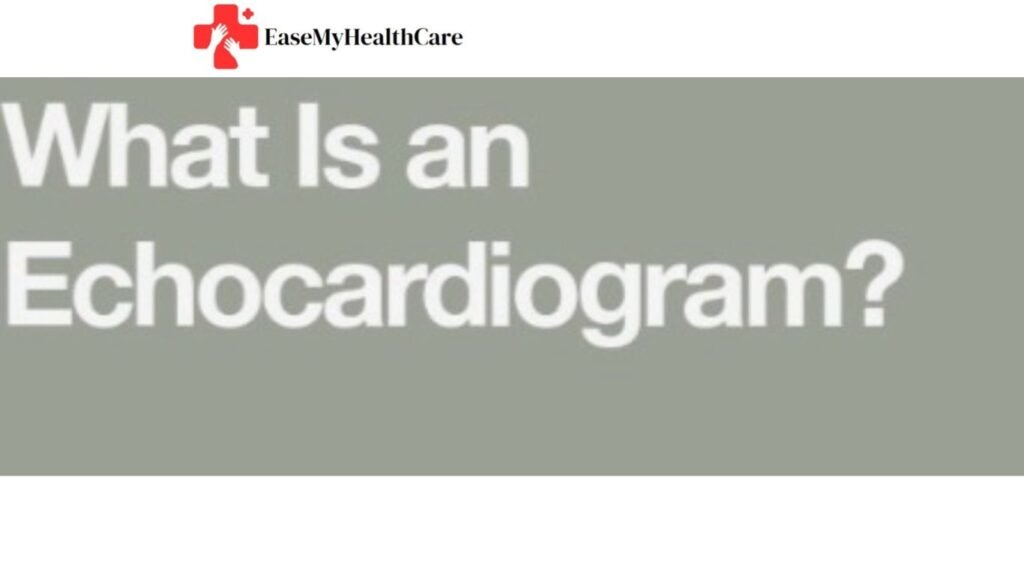Introduction
An echocardiogram is a crucial heart test that uses ultrasound waves to create images of the heart, helping doctors assess its structure and function. Patients often search for “echocardiogram test cost” to understand its affordability and significance. This guide provides comprehensive details about echocardiogram pricing, types, benefits, risks, and the best hospitals for heart screening.
What is an Echocardiogram Test?
An echocardiogram (ECHO) is a non-invasive test that evaluates heart health by producing real-time images of heart chambers, valves, and blood flow. It helps in diagnosing heart diseases, structural abnormalities, and heart valve disorders.

Why is an Echocardiogram Done?
Doctors recommend an ECHO test for:
- Diagnosing heart valve problems
- Detecting congenital heart defects
- Assessing heart muscle damage after a heart attack
- Monitoring heart disease progression
- Checking for fluid buildup (pericardial effusion)
Types of Echocardiogram Tests & Their Costs in India
The cost of an echocardiogram test depends on the type of test, hospital, and city. Below is an approximate price breakdown:
| Type of Echocardiogram | Purpose | Estimated Cost (INR) | Estimated Cost (USD) |
|---|---|---|---|
| Transthoracic Echocardiogram (TTE) | Standard non-invasive heart ultrasound | ₹1,500 – ₹4,000 | $20 – $50 |
| Transesophageal Echocardiogram (TEE) | Detailed imaging using a probe inserted into the esophagus | ₹5,000 – ₹12,000 | $60 – $150 |
| Stress Echocardiogram | Evaluates heart function under stress conditions | ₹3,000 – ₹8,000 | $40 – $100 |
| Fetal Echocardiogram | Checks for congenital heart defects in unborn babies | ₹3,500 – ₹9,000 | $45 – $110 |
| Contrast Echocardiogram | Uses contrast dye for clearer imaging of heart structures | ₹6,000 – ₹15,000 | $75 – $180 |
Factors Affecting Echocardiogram Test Cost
Several factors influence the final cost of an echocardiogram, including:
- Type of ECHO Test – TEE and contrast ECHO tests are more expensive than standard TTE tests.
- Hospital and Location – Leading hospitals in Delhi, Mumbai, Bangalore, and Chennai may have slightly higher costs.
- Doctor’s Expertise – Cardiologists and cardiac imaging specialists may charge a higher consultation fee.
- Additional Tests – If combined with ECG, Holter monitoring, or blood tests, the total cost increases.
- Insurance Coverage – Some health insurance plans cover echocardiograms, reducing out-of-pocket expenses.
Best Hospitals for Echocardiogram Tests in India
India is home to some of the top cardiac hospitals that offer advanced ECHO imaging with expert cardiologists:
- Fortis Escorts Heart Institute, Delhi – A leading heart hospital with advanced diagnostic facilities.
- Apollo Hospitals, Chennai & Delhi – Offers high-end 3D and Doppler echocardiography.
- Narayana Health, Bangalore – Known for affordable and high-quality cardiac care.
- Medanta – The Medicity, Gurgaon – Specializes in heart failure assessment using echocardiography.
- Asian Heart Institute, Mumbai – Provides advanced stress ECHO and transesophageal echocardiography.
Benefits of an Echocardiogram Test
- Early Detection of Heart Disease – Helps identify heart valve issues, blood clots, and abnormalities.
- Non-Invasive & Painless – No radiation exposure, making it a safe diagnostic tool.
- Fast & Reliable Results – Most echocardiograms take 15-30 minutes, with immediate results.
- Monitors Heart Health – Useful for patients with hypertension, arrhythmia, or post-heart surgery care.
Risks and Side Effects
An ECHO test is extremely safe, but minor discomfort may occur in certain cases:
- Mild throat irritation (if undergoing TEE test)
- Allergic reaction (rare in contrast echocardiograms)
- Slight dizziness after a stress ECHO test
Frequently Asked Questions (FAQs)
1. Is an echocardiogram covered by insurance?
Yes, most health insurance plans cover echocardiograms, especially for cardiac patients.
2. How long does an echocardiogram take?
A standard transthoracic echocardiogram takes 15-30 minutes, while a TEE test may take up to 45 minutes.
3. Does an ECHO test detect heart blockage?
No, an echocardiogram does not directly detect blockages but can show signs of reduced blood flow.
4. Can I eat before an echocardiogram?
For a TTE or stress ECHO, you can eat normally. However, for a TEE test, fasting for 6 hours is required.
5. How often should I get an echocardiogram?
For heart patients, doctors may recommend an annual ECHO test. Healthy individuals may need one only if symptoms arise.
Why Choose India for Echocardiogram Tests?
- Affordable Costs – India offers ECHO tests at 60-80% lower than Western countries.
- Highly Skilled Cardiologists – Board-certified heart specialists with international training.
- Advanced Technology – Top hospitals use 3D ECHO, Doppler imaging, and AI-based cardiac assessments.
- Medical Tourism Support – Services like EaseMyHealthcare assist international patients in finding the best hospitals.
Conclusion
An echocardiogram test is essential for diagnosing and monitoring heart health, and India offers world-class cardiac diagnostics at affordable prices. Whether you need a routine heart check-up or advanced imaging, top hospitals provide expert care with cutting-edge technology.
For expert assistance in booking an echocardiogram test in India, contact EaseMyHealthcare, your trusted partner in medical tourism.




